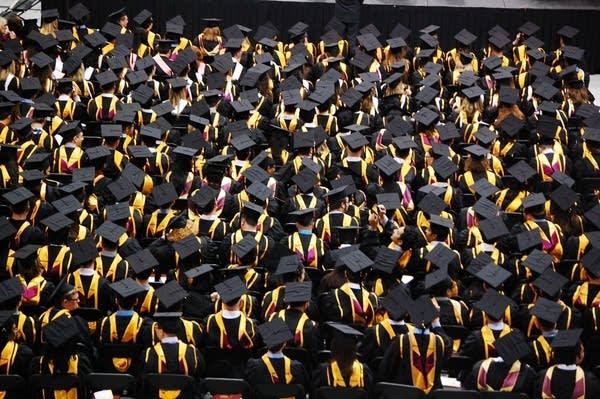Grad school wasn't a good hideout from recession

When the recession hit a few years ago, graduate school may have looked like a good spot to ride out a rocky economy for those who could afford it.
Back then, the term "jobless recovery" had yet to enter the lexicon. But many of those students are emerging from colleges now, master's degrees in hand, and finding little improvement in the job market after their two or three years in school.
They include Grace Hanson, who started began pursuing a master's in public policy at the University of Minnesota in the fall of 2009. Hanson, 30, returned to school because she didn't feel challenged by her job in the publishing industry.
Hanson also wanted a career in government human services, a job she didn't think she could get in a tough market without an advanced degree.
Create a More Connected Minnesota
MPR News is your trusted resource for the news you need. With your support, MPR News brings accessible, courageous journalism and authentic conversation to everyone - free of paywalls and barriers. Your gift makes a difference.
"I felt like to compete in the new economy it really meant that I had to go to that next level of grad school," she said.
Less than two weeks away from earning her master's degree, Hanson doesn't yet have a job lined up. The government sector isn't doing much hiring these days.
"When I went into grad school in 2009 I was secretly hoping in two years that the economy would be totally turned around and that there would be a ton of jobs that would be the right fit for me," she said.
Hanson is confident she'll find a job soon, and thinks her degree will position her well for any future opportunities in a tight job market.
The job market for new grads with master's degrees is better than it was in the last two years, but it's still a disappointment to many, said Devin Driscoll, president of the Council of Graduate Students at the University of Minnesota.
"I think all of us, no matter what sector you're in, had hoped that we'd bounce back from this a little quicker," he said.
Driscoll said there is an assumption, born out of plenty of anecdotal evidence, that some students pursue a master's degree to escape a tough job market.

That may be one of many reasons behind their decision, he said, but it's hard to see graduate school as a shelter from the bad economy.
"The life of a graduate student is not an easy one," Driscoll said. "You have to weigh your willingness to take a pretty significant step back from whatever life you've been leading and really devote yourself to graduate school."
The University of Minnesota doesn't look favorably on students who cite the poor job market as the only reason why they're considering graduate school.
Noro Andriamanalina, the director of academic and professional development in the university's graduate school, said some students do inquire about graduate school as a way to ride out the poor economy. But what some may consider a haven from the job market also comes with considerable writing, testing, research work and cost.
"When they meet with career advisers or counselors or talk with professors, they realize that's not enough," Andriamanalina said.
It doesn't appear the economy has had a dramatic effect on the number of students applying to graduate school at the U of M. This year, 7,400 applied, up from 6,600 in 2001.
Jose Pacas, who started graduate school at the university's Humphrey School of Public Affairs two years ago, long planned on earning a master's degree. He said it came as a relief when he didn't have to wade into the tough job market two years ago.
Pacas, who is preparing to pursue a PhD in applied economics, is now watching his fellow graduates struggle to find work, and is again relieved his job search is delayed.
"You weigh your options," he said. "I have a full ride for a PhD or I have potentially absolutely nothing in the job market."
Like many students before him, Pacas hopes the job market will improve by the time he's finished with school, in another four or five years.
